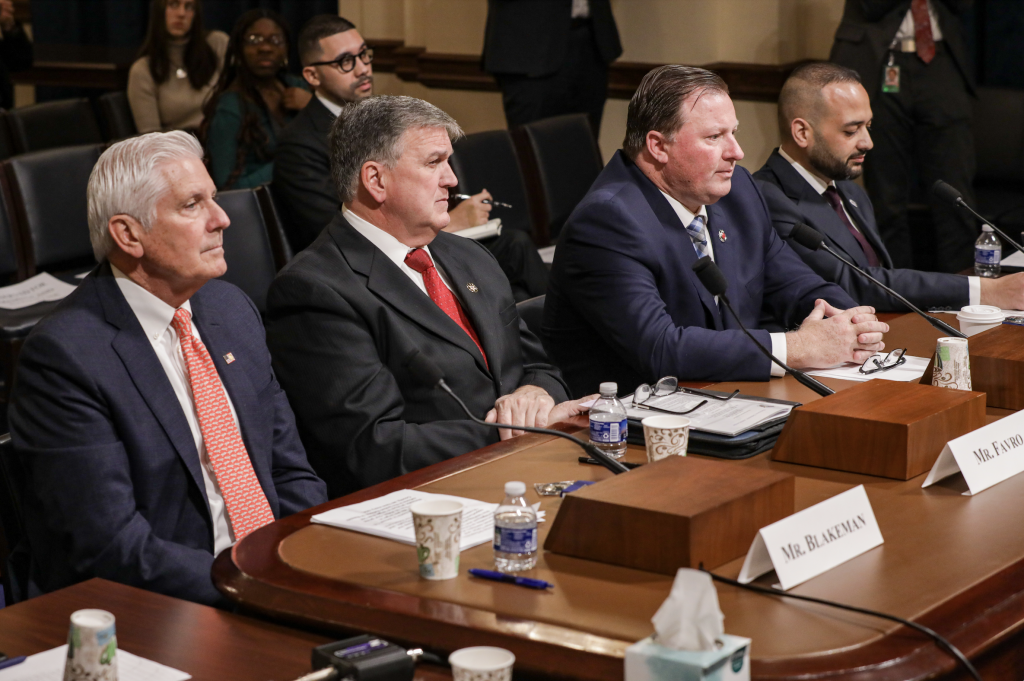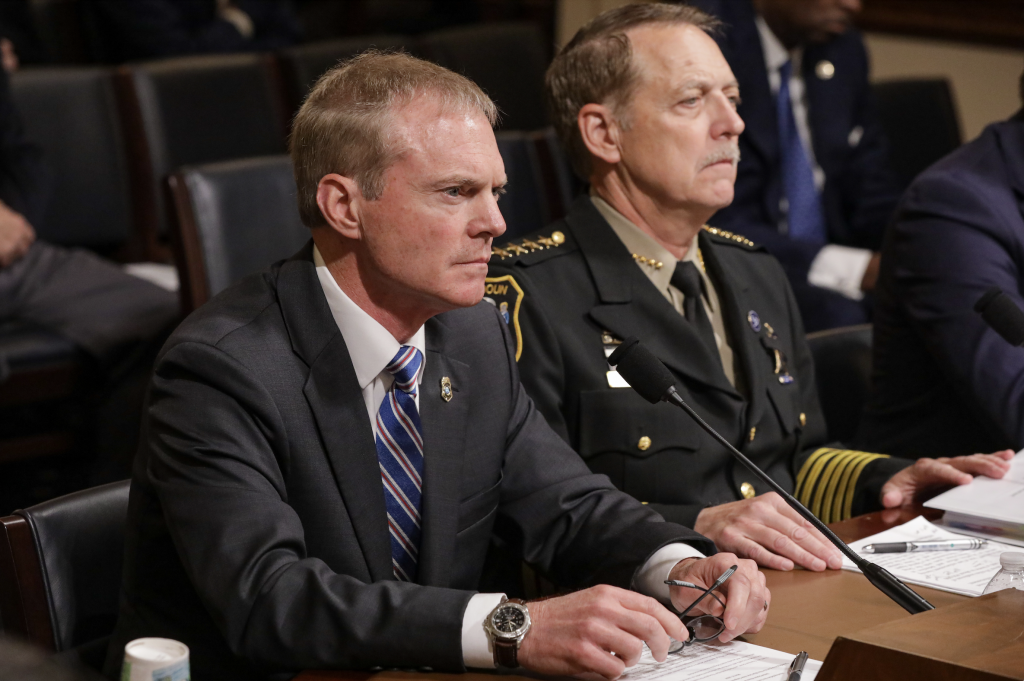NEWSLETTER: Lessons From Law Enforcement
May 18, 2024
When Americans are confronted with tragedies like the one just a few weeks ago in Charlotte, where four police officers were tragically gunned down in the line of duty, it is a solemn reminder of the dangers faced by all those who wear the badge. So far in 2024, 56 of these brave men and women have been killed in the line of duty, a 12-percent increase from this time last year. We are also not far removed from 2021, the deadliest year for law enforcement in the past two decades.
The House Committee on Homeland Security has a responsibility to support law enforcement at all levels of government through legislation, oversight, and recognition––work that is rooted in gratitude for the men and women who wear the badge and who have made the ultimate sacrifice.
The Committee has received critical information and testimony from numerous law enforcement personnel from across the country throughout the 118th Congress, all while conducting critical oversight of the Department of Homeland Security’s (DHS) support for those who serve.

The Crime and Border Crises Impacting Law Enforcement
“Though we are not a border city, the impact of immigration policies is felt by us as well.”
Officer Michael Bullock, president of the Austin, Texas Police Association
Just this week, the Committee received testimony from multiple members of law enforcement in a hearing held in recognition of National Police Week. Law enforcement officials from across the country detailed the challenges facing law enforcement, notably as a result of the border crisis, shortfalls in information and intelligence-sharing by the federal government—specifically by DHS—and local soft-on-crime policies.
Loudoun County, Virginia, Sheriff Mike Chapman shared an instance where information impacting the safety of Loudoun County residents was not shared in its entirety, or in a timely manner, by DHS––forcing him to mobilize the local police force and emergency management personnel on his own. According to Chapman, he was notified that some 1,000 refugees would be arriving in his county following the Biden administration’s disastrous withdrawal from Afghanistan. He immediately reached out to DHS for more information and to question why they did not receive earlier notification. None of his concerns were addressed by the Department, forcing Sheriff Chapman to organize a thorough local initiative. This “extraordinary effort,” he said, could have been avoided had DHS communicated properly.
Not only did members learn more about DHS’ information-sharing failures, but Senior Police Officer Michael Bullock of the Austin Police Department informed members that Texas state troopers used to have a large impact on deterring crime in Austin, but have recently been pulled away to address the crisis at the Southwest border. Officer Bullock explained how detectives, who normally focus on major crimes, homicides, and robberies, are now having to work patrol shifts on a regular basis. He told members this has a “significant impact” on mental health, and “adds another layer of unpredictability to an already unpredictable job.”

Chief Patrol Agents, Frontline Law Enforcement Share the Truth About the Border Crisis
“A large percentage of the Border Patrol agents were pulled off of their line functions and performing administrative or processing duties rather than performing that frontline law enforcement mission.”
Deputy Chief Patrol Agent Dustin Caudle, Yuma Sector
Under the Biden administration, U.S. Customs and Border Protection (CBP) has recorded more than 9.5 million encounters nationwide, including more than 7.8 million at the Southwest border.
Last year, from April-September, the Committee conducted transcribed interviews with eight chief patrol agents and one deputy chief patrol agent responsible for the sectors along the Southwest border. These law enforcement leaders revealed many of the challenges they face daily as a result of President Biden’s and DHS Secretary Mayorkas’ open-border policies and the historic crisis they have unleashed.
Then-Chief Patrol Agent of the San Diego Sector Aaron Hetike told our committee many Border Patrol agents are being pulled away from the field and their job of patrolling the border to process illegal aliens giving themselves up en masse at remote portions of the border.
When asked if more agents were doing processing and less front line work during recent surges, one chief patrol agent replied, “for the most part.” She was then asked what kind of impact this adjustment has on agents’ morale and replied, “It has a significant impact. I think agents, for the most part, want to be on patrol. They want to do the mission of border security.”
She also told the Committee, based on the definition in the Secure Fence Act of 2006, “we don’t have operational control of the border.”
These interviews confirm that significant numbers of Border Patrol agents have been reassigned to processing and releasing illegal aliens into the country rather than guarding and securing the border between ports of entry. It is clear this crisis negatively affects the morale of these agents in the field and increases the numbers of gotaways and illicit drugs crossing the border, putting our homeland security at risk.

Assessing the Public Safety Impacts of the Border Crisis
“We were averaging about 100-105 detainees on a given day. That went up to about 160-170 [detainees] two years ago, because we have a contract with the United States Border Patrol.”
David Favro, sheriff of Clinton County, New York
In December 2023, the Subcommittee on Emergency Management and Technology, led by Chairman Anthony D’Esposito (R-NY), held a hearing to assess the impact of the border crisis on public safety. David Favro, sheriff of Clinton County, New York, testified on behalf of the National Sheriffs’ Association.
When asked by Rep. Dale Strong (R-AL) about the effects of the border crisis on his jail costs, medical costs, corrections officer costs, and burnout, Sheriff Favro replied, “Starting with the jail, we’re seeing a significant increase.” He then explained they were averaging about 100-105 detainees a day, but that this increased to 160-170 about two years ago because of a contract his department has with the Border Patrol. Favro added, “I believe we’re the only county jail left in the state of New York that will house Border Patrol detainees…The cost is approximately $112 a night, which results in over $2 million dollars a year that is paid out for the detention at our facility.”

Law Enforcement Fight the Rise of Organized Retail Crime
“I think what we’re doing, and [what] we need to do a better job of, is making sure that we’re reaching into our private sector and state local partners to ensure that they understand the resources available to them.”
Michael Krol, special agent in charge, New England Field Office, Homeland Security Investigations (HSI)
Also in December 2023, the Subcommittee on Counterterrorism, Law Enforcement, and Intelligence, led by Chairman August Pfluger (R-TX), held a hearing to examine the impact organized retail crime (ORC) has on American businesses and communities across the country.
When asked by Subcommittee on Oversight, Investigations, and Accountability Chairman Dan Bishop (R-NC) if lax border-security policies contribute to organized retail crime operations by transnational criminal organizations, Michael Krol, the special agent in charge at HSI’s New England Field Office, answered, “We’re certainly laser-focused on criminal networks and those criminal networks that affect our national border and economic security, whether they reside internationally and domestically.” Jason Krane, special agent in charge at the U.S. Secret Service’s Nashville Field Office, later referenced some groups coming in, “kind of subverting the border process.”
Later in the same hearing, D’Esposito, also a retired law enforcement officer and first responder, asked what Congress could do to make sure local law enforcement knows what resources federal partners provide. Special Agent Krol indicated it would be helpful to insert special agents in their subject matter of expertise into local police departments and let them be the best resource for local agencies to then go to HSI, Secret Service, FBI, or any other relevant federal agency.

Ensuring DHS Supports State and Local Law Enforcement
“We have very little contact with DHS. [We] have a lot of contact with our other federal partners, but we do not have very much contact with members of DHS.”
Loudoun County Sheriff Mike Chapman
As threats faced by law enforcement continually evolve, it is vital that the federal government, and DHS in particular, is engaged with state and local authorities across America to safeguard our communities. DHS’ Office of Intelligence and Analysis (I&A) is at the center of these efforts, working to develop and deliver intelligence to law enforcement and intelligence partners.
However, I&A has fallen short in its mission of providing effective and timely intelligence to stakeholders on multiple occasions. This is detrimental to the security of the homeland, and the safety of Americans.
In August 2023, the Committee probed the limited number of security clearances issued by the office to state and local law enforcement partners. Empowering every law enforcement partner with the necessary information and intelligence to defend our communities from threats must remain a top priority of the department.
Congress must never lose sight of the state and local law enforcement on the frontlines of the homeland security mission. This National Police Week, and every day, the House Committee on Homeland Security is committed to upholding law and order, and supporting the men and women who risk their lives to enforce it.
###
